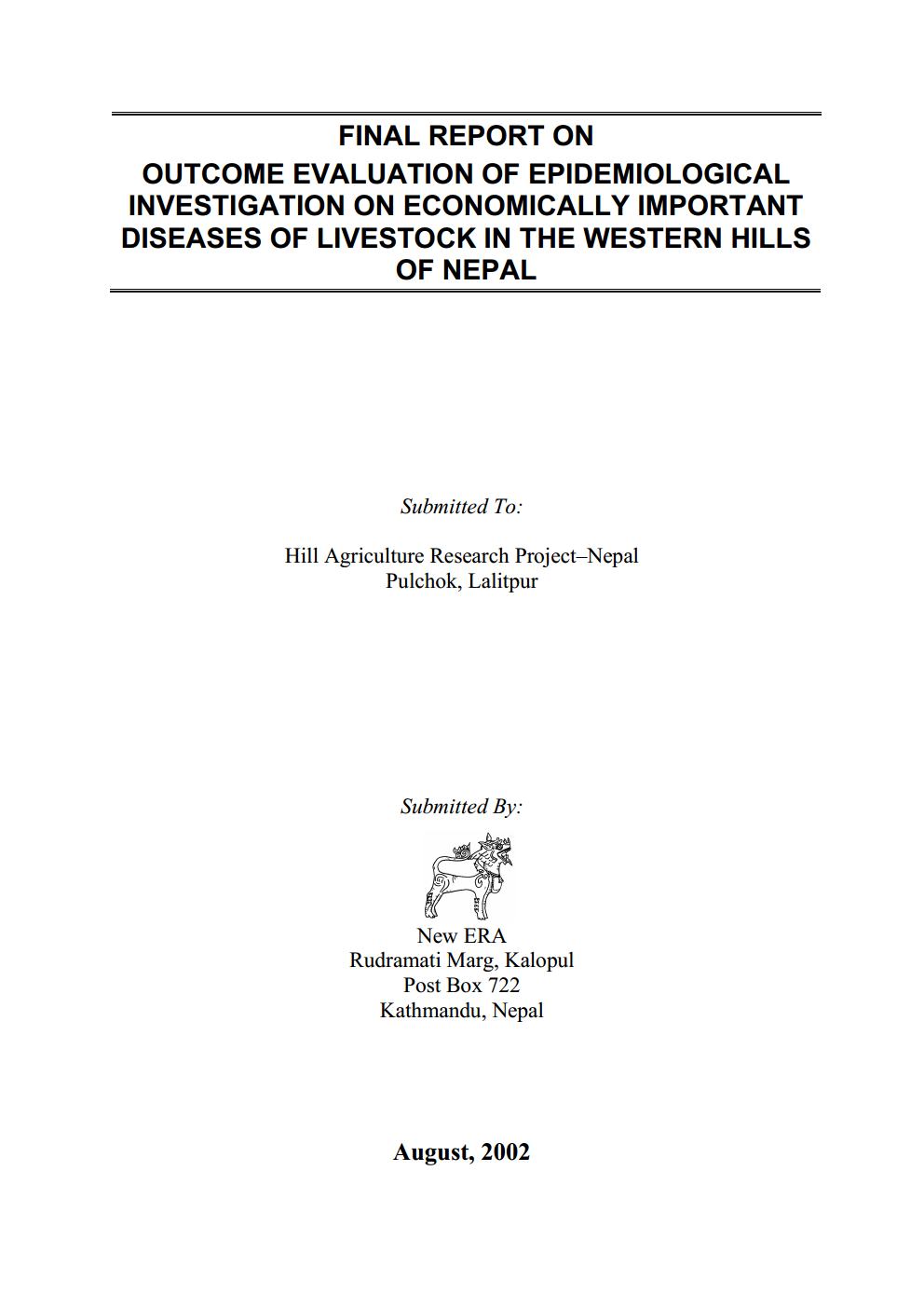This study evaluates the marketing of Mandarin orange (Citrus reticulata) in Nepal. This outcome evaluation is carried out based on the information collected through the outcome evaluation forms, literature review and field observations. The study is focused around the achievement and effectiveness of the project outcome in terms of quality, quantity and timely delivery to the targeted beneficiaries.
Report Type: Agriculture
Management of Goats and Farmer Livelihoods in Dhanusha and Makawanpur Districts of Nepal
This study describes as part of Livestock Research Project “Developing Banmara (Eupatorium adenophorum or Chromolaena odorata) as a forage for goats kept by resource poor farmers in the Himalayan forest areas. The study was carried out over a six month period of Nepali goat keeping practices in four communities, two in the Terai and two in the mid hills. In each community, 10 poor and 10 less poor households and their goats were studies. The main aim of the study was to increase knowledge of the contribution of goats to the livelihoods of poor livestock keepers; to explore with the communities the potential for increased use of banmara, provided that a suitable treatment could be found to make it more palatable; to learn about the access and control of goats, their products and forage by men, women and children; assesses the goat feeding practices on wet and dry season and constraints imposed by seasonal forage shortage. Data were collected on income from different household activities, contribution of income from each activity to livelihoods objectives, goat productivity and health and goat feeding.
Final Report on Outcome Evaluation of Epidemiological Investigation on Economically Important Diseases of Livestock in the Western Hills of Nepal
This study evaluates the outcome of Evaluation of Epidemiological Investigation on Economically Important
Diseases of Livestock in the Western Hills of Nepal undertaken by Agricultural Research Station (ARS), Lumle
and in the selected villages in the districts of its command areas. The study was conducted through literature
review, consultations/ interactions with scientists, technicians and managers, and the field surveys. The
evaluation is focused around the achievements and effectiveness of the project outcomes stated in the project
log-frame in terms of quality, quantity and timely delivery to the targeted beneficiaries.
Large Block Production-Cum-Seed Multiplication of Rapeseed in Dang District
Rapeseed is the principal cash crop in Dang District. In recent years, rapeseed yield has been depressed with productivity as low as 0.6 metric tons/ha as compared to a possible yield of over one metric ton/ha. The New ERA Agricultural Development Centre (NEADC), New ERA’s sister organization based in Dang, started a large block production-cum-seed multiplication program in different villages in Dang. The program uses participatory, bottom-up planning and a one window approach. The aim of the program is to increase the rapeseed yield through improved production practices. The program has been successful in increasing the yield of rapeseed and as a result the demand for NEADC seed has increased every year. The model developed by NEADC was replicated by INGOs/NGOs/GOs.
Feeding Banmara to Goats
Banmara (Eupatorium adenophorum or Chromolaena odorata) is a wild plant species which grows abundantly in the forests of Nepal. It has no practical or commercial use and its unchecked growth is damaging the forest resources of Nepal. New ERA was commissioned by DFID to identify the toxic substance in the plant which prevents goats from eating it and to develop a simple method of treating the plant so that it can be used to feed goats.
Outcome Evaluation of Identification of Farmers’ Adoption Criteria for Improved Rice Varieties Selection
This study evaluates the HARP funded project titled “Identification of Farmers’ Adoption Criteria for Improved
Rice Varieties Selection”. The study found that the project was successful in identifying improved normal rice
varieties and in encouraging farmers to adopt the improved varieties. About 55 percent of the total sample group
of farmers adopted the improved rice varieties.
Outcome Evaluation of Use of Participatory Methods to Generate Information on Soil Fertility Issues
This study was conducted to evaluate the project titled “Use of Participatory Methods to Generate Information on
Soil Fertility Issues in ARS Kavre Command Area”. The main aim of this project was to make information on soil
fertility issues available for use by farmers, researchers and extension personnel. The evaluation found that the
project was successful in making information on soil fertility issues available to farmers, researchers and
extension personnel.
Outcome Evaluation of Soil Fertility Management for Sustainable Hillside Farming System in Nepal
Hill Agriculture Research Project (HARP) funds hundreds of projects through the NARC, various NGOs and
private organizations. New ERA developed a standard format to evaluate these different projects for HARP. This
particular study was conducted using the standard format to evaluate the effectiveness of the soil fertility program
in increasing food production and encouraging sustainable crop production practices in the mid-hills of Nepal.




